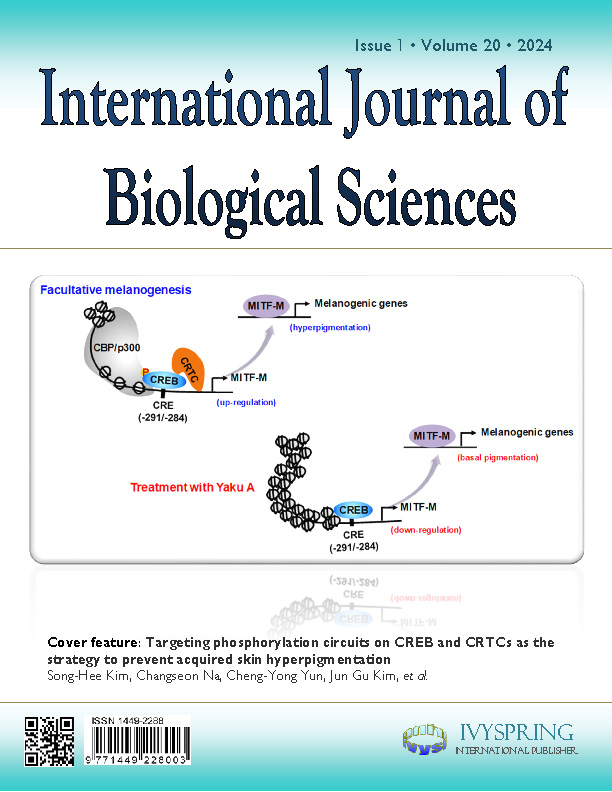METTL18 在 HER2 阴性乳腺癌的 Src 依赖性致癌反应中发挥表型调节器的作用
IF 8.2
2区 生物学
Q1 BIOCHEMISTRY & MOLECULAR BIOLOGY
引用次数: 0
摘要
甲基转移酶样(METTL)18 对 RPL3 蛋白具有组氨酸甲基转移酶活性,参与核糖体的生物合成和翻译延伸。一些研究报告指出,肌动蛋白聚合是 Src 的调节因子,而 HSP90 参与形成聚合的肌动蛋白束。为了了解 METTL18 在乳腺癌中的作用并证明 METTL18 在 HER-2 阴性乳腺癌转移中的重要性,我们在体外(乳腺肿瘤细胞系)、体内(肿瘤异种移植模型)和人类乳腺肿瘤样本中使用了生化、分子生物学和免疫学方法。通过比较乳腺癌患者中 31 个 METTL 系列基因和 22 个甲基转移酶的基因表达,发现 METTL18 在人类 HER2 阴性乳腺癌中高度扩增。此外,HER2 阴性乳腺癌患者的 METTL18 表达水平升高与预后不良有关。METTL18 的缺失会明显降低乳腺肿瘤细胞在体外和体内的转移反应。从机理上讲,METTL18 通过 METTL18 介导的 RPL3 甲基化间接调节 MDA-MB-231 细胞中原癌基因酪氨酸蛋白激酶 Src 及其下游分子的磷酸化,而 Src 也参与决定 HSP90 的完整性和蛋白水平。在共聚焦显微镜和 F/G 肌动蛋白测定中,发现 METTL18 可通过 HSP90 诱导肌动蛋白聚合。涉及 METTL18、RPL3、HSP90 和肌动蛋白聚合的分子事件导致 Src 在酪氨酸 419 和酪氨酸 530 处磷酸化,具有激酶活性和致癌功能。因此,METTL18-HSP90-肌动蛋白-Src调控轴在HER2阴性乳腺癌的转移反应中起着关键的致癌作用,可能是一个很有前景的治疗靶点。本文章由计算机程序翻译,如有差异,请以英文原文为准。
METTL18 functions as a Phenotypic Regulator in Src-Dependent Oncogenic Responses of HER2-Negative Breast Cancer
Methyltransferase-like (METTL)18 has histidine methyltransferase activity on the RPL3 protein and is involved in ribosome biosynthesis and translation elongations. Several studies have reported that actin polymerization serves as a Src regulator, and HSP90 is involved in forming polymerized actin bundles. To understand the role of METTL18 in breast cancer and to demonstrate the importance of METTL18 in HER-2 negative breast cancer metastasis, we used biochemical, molecular biological, and immunological approaches in vitro (breast tumor cell lines), in vivo (tumor xenograft model), and in samples of human breast tumors. A gene expression comparison of 31 METTL series genes and 22 methyltransferases in breast cancer patients revealed that METTL18 is highly amplified in human HER2-negative breast cancer. In addition, elevated levels of METTL18 expression in patients with HER2-negative breast cancer are associated with poor prognosis. Loss of METTL18 significantly reduced the metastatic responses of breast tumor cells in vitro and in vivo. Mechanistically, METTL18 indirectly regulates the phosphorylation of the proto-oncogene tyrosine-protein kinase Src and its downstream molecules in MDA-MB-231 cells via METTL18-mediated RPL3 methylation, which is also involved in determining HSP90 integrity and protein levels. In confocal microscopy and F/G-actin assays, METTL18 was found to induce actin polymerization via HSP90. Molecular events involving METTL18, RPL3, HSP90, and actin polymerization yielded Src phosphorylated at both tyrosine 419 and tyrosine 530 with kinase activity and oncogenic functions. Therefore, it is suggested that the METTL18-HSP90-Actin-Src regulatory axis plays critical oncogenic roles in the metastatic responses of HER2-negative breast cancer and could be a promising therapeutic target.
求助全文
通过发布文献求助,成功后即可免费获取论文全文。
去求助
来源期刊

International Journal of Biological Sciences
生物-生化与分子生物学
CiteScore
16.90
自引率
1.10%
发文量
413
审稿时长
1 months
期刊介绍:
The International Journal of Biological Sciences is a peer-reviewed, open-access scientific journal published by Ivyspring International Publisher. It dedicates itself to publishing original articles, reviews, and short research communications across all domains of biological sciences.
 求助内容:
求助内容: 应助结果提醒方式:
应助结果提醒方式:


